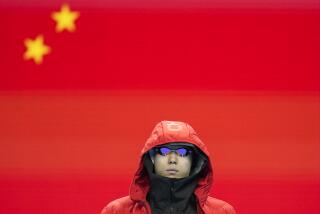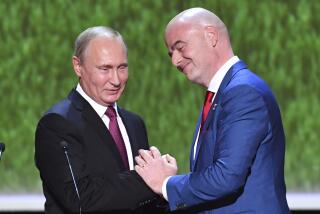Russia’s performance in World Cup — and the country’s history — are raising doping suspicions
Reporting from NIZHNY NOVGOROD, Russia — During the 2014 Sochi Winter Games, the last major international sporting event held in Russia, athletes from the host country topped the medal count with 33, including 13 golds. It was a performance that seemed too good to be true.
And it was. Seven months ago, the International Olympic Committee sanctioned 43 athletes after an investigation into a state-run doping program, planned for years to ensure dominance at the Sochi Games.
Twenty-eight athletes were later reinstated, but the stain of one of the most elaborate and successful doping ploys in sports remained. That doubt now hovers over the country’s soccer team, which entered the World Cup ranked 70th yet finds itself among the final eight teams.
Russia will meet Croatia in the quarterfinals Saturday in Sochi, where it will play in a stadium built to stage the opening and closing ceremonies of those now-discredited Winter Olympics.
And though there is no evidence of any wrongdoing with the soccer team, its performance here — including a round of 16 win over Spain, the World Cup champion eight years ago — has raised eyebrows.
“Let’s hope their performances are miraculous and they’re doing it the right way,” Travis Tygart, chief executive for the U.S. Anti-Doping Agency, told the Associated Press this week. “It’s unfair to draw any conclusions different than that. But the problem is the system in Russia has let the athletes down and created a dark cloud that’s going to follow every performance those guys have.”
It already has. The Russian team has displayed uncommon fitness, as when Aleksandr Golovin surged by Spain’s Iago Aspas for a loose ball even though he’d played the entire game and Aspas had just entered.
Golovin led all players in distance covered, most sprints and top speed. A team’s best sprinter is rarely its best long-distance runner. But Golovin isn’t getting much benefit of the doubt.
Goalkeeper and captain Igor Akinfeev said the team has nothing to do with the Olympic program. But he made those comments at Russia’s Novogrosk Olympic base outside Moscow, which the team shares with numerous other sports. On the next field, members of Russia’s suspended track and field team trained, including triple jumper Ekaterina Koneva, who was once banned for having artificially high testosterone levels.
Deputy Prime Minister Vitaly Mutko — who was sports minister for the 2014 Sochi Olympics — is a frequent visitor to Russia’s training sessions and celebrated the Spain win in the team’s dressing room. He was banned from the Olympics for life in December after the International Olympic Committee ruled his ministry didn’t do enough to stop organized doping.
There’s no suggestion that Russia’s soccer team used the Olympic sample-swapping technique that the World Anti-Doping agency dubbed the “disappearing positive methodology.” But WADA found that positive tests were referred to sports ministry officials who would decide whether to “save” the player by covering up the test. This allegedly happened for at least eight men’s players, including defender Ruslan Kambolov, who was in Russia’s preliminary World Cup squad but not the final 23-man list.
“In sports, you want everyone to be willing to believe in the magic, but when you’re not willing to give concrete data, it’s hard,” Tygart said. “And you can assume they don’t give them in part because the data isn’t very good.”
Making the World Cup even more fun
An influx of visitors for Saturday’s World Cup semifinal between England and Sweden combined with a heat wave have led city leaders in Samara to urge residents to shower in pairs to save water.
The Samara Communal Systems utility company says it is providing 10% more cold water than normal, causing water pressure to drop in some neighborhoods.
A City above
The rosters of the eight World Cup quarterfinalists include a record 11 players from English Premier League club Manchester City, one better than the old mark held by Germany’s Bayern Munich.
French club Paris Saint-Germain has eight players in the quarterfinals.
The Associated Press contributed to this report.
[email protected] | Twitter: @kbaxter11







